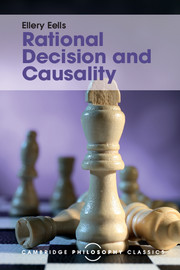Book contents
- Frontmatter
- Dedication
- Contents
- Preface to this edition
- Preface
- Introduction
- 1 Bayesianism
- 2 The philosophical and psychological significance of Bayesian
- 3 Bayesian decision theories: some details
- 4 The counterexamples
- 5 Causal decision theories
- 6 Common causes, reasons and symptomatic acts
- 7 A general defense of PMCEU
- 8 Newcomb's paradox
- Appendix 1 Logic
- Appendix 2 Probability
- Bibliography
- Index
- Frontmatter
- Dedication
- Contents
- Preface to this edition
- Preface
- Introduction
- 1 Bayesianism
- 2 The philosophical and psychological significance of Bayesian
- 3 Bayesian decision theories: some details
- 4 The counterexamples
- 5 Causal decision theories
- 6 Common causes, reasons and symptomatic acts
- 7 A general defense of PMCEU
- 8 Newcomb's paradox
- Appendix 1 Logic
- Appendix 2 Probability
- Bibliography
- Index
Summary
Imagine yourself in the following situation. There are two boxes before you: one transparent and one opaque. You can see that there is $1,000 in the transparent box, and you know that there is either $1,000,000 or nothing in the opaque box. You must choose between the following two acts: take the contents only of the opaque box or take the contents of both boxes. Furthermore, there is a being in whose predictive powers you have enormous confidence, and you know that he has already determined the contents of the opaque box according to the following rules: If he predicted that you would take the contents only of the opaque box, he put the $1,000,000 in the opaque box, and if he predicted that you would take the contents of both boxes, he put nothing in the opaque box. What would you do?
A paradox, known as ‘Newcomb's paradox’, seems to arise. Robert Nozick (1969) discusses the paradox in detail. It appears that two principles of decision – both of which are well-respected and intuitively attractive – prescribe different courses of action in the decision situation described above. Consider this version of the principle of dominance: If (i) you must perform either act A or act B, (ii) which act you perform does not causally affect which of two states of affairs, S and –S, obtains, and (iii) no matter which of S and –S obtains, you are better off doing A than doing B, then do A. In the decision situation described above, (i) you must either take the contents only of the opaque box or take the contents of both boxes, (ii) which act you perform does not affect whether or not the $1,000,000 is in the opaque box, and (iii) whether the $1,000,000 is in the opaque box or not, you get $1,000 more by taking the contents of both boxes than you get by taking the contents only of the opaque box. So the principle of dominance recommends taking the contents of both boxes.
Now consider this rough statement of the principle of maximizing conditional expected utility (hereafter, PMCEU): perform the act that makes the most desirable outcomes the most probable.
- Type
- Chapter
- Information
- Rational Decision and Causality , pp. 1 - 2Publisher: Cambridge University PressPrint publication year: 2016
- 1
- Cited by



